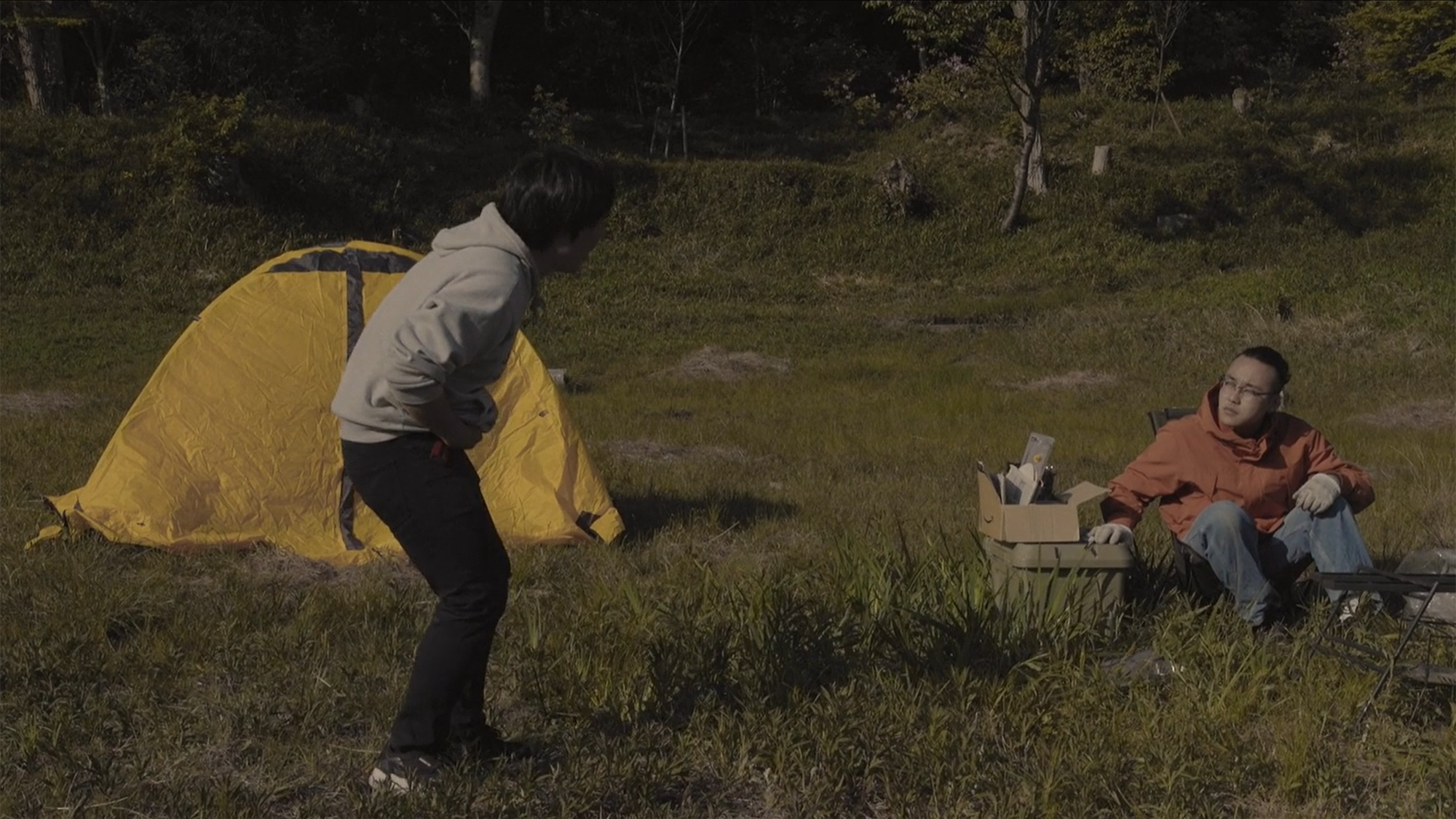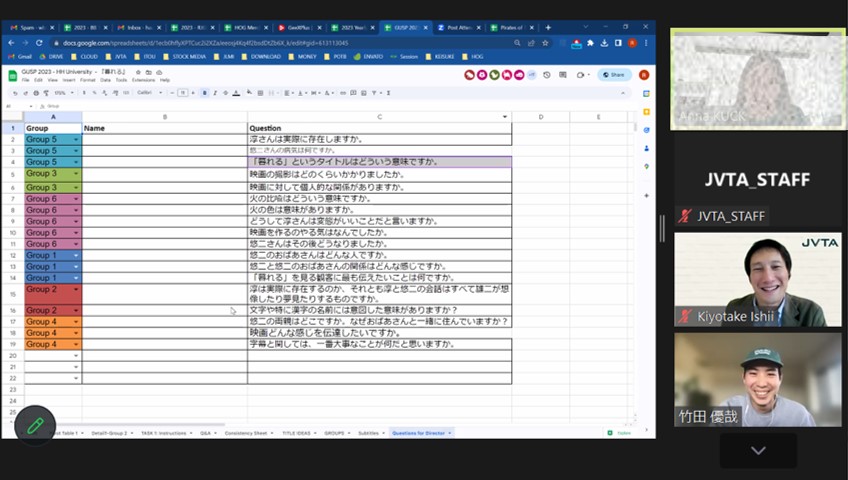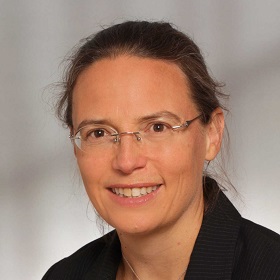The Art of Comprehending:
Subtitling by Understanding the Connection Between Titles and Lines
The Global Universities Subtitling Project (GUSP) is a collaboration between the Japan Visualmedia Translation Academy and several universities worldwide. This year, 2023, marked the 9th collaboration with Heinrich Heine University Dusseldorf in Germany. This time, 24 students majoring in the Japanese language and culture translated and subtitled the short film LIGHT CHANGES, or Kureru (lit. To end) by director Yuya Takeda. JVTA and Heinrich Heine have been working together since 2017, and all of the classes have been conducted online.
This film contained around 400 subtitles total, which were divided among the groups of students. Each group of 4 students worked on 60 to 70 lines and had group discussions to come up with the English translations.
The story goes as follows. LIGHT CHANGES follows Yuji Nakagawa, an unemployed 22-year-old who lives with his grandmother and beloved pet dog. One day when walking the dog, Yuji is suddenly overcome with terrible stomach pain, and his dog runs away. As he scrambles around searching for it, Yuji meets Atsushi, who is camping by the riverbed. Yuji ends up camping with Atsushi, and drama ensues.

A Scene from LIGHT CHANGES
To the left: the Protagonist, Yuji, To the right: Atsushi
The class began with breaking down the story of the film in order to understand it.
Several groups commented on the importance of Yuji and Atsushi's camping scene, saying that it "left an impression" and pointing out that "Yuji doesn't know who or what Atsushi is. Because they have no connection, it's easy for Yuji to open up about difficult topics to him." Furthermore, one student remarked that "Yuji's situation and conflicting emotions might be something unique to Japanese society," which gave insight into how a non-Japanese student might view the film.
Once they have a handle on the story of the film, it's time to start translating. JVTA's Kiyotake Ishii, Bill Reilly, and Kajetan Rodziewicz gave feedback on the students' subtitles and advice on how to improve them. The edited their work based on this feedback, returning to the three teachers for more feedback as a cycle developed.
At first, the students' translations ended up being direct, almost word-to-word translations, as they carefully translated each word in the dialogue, including filler words such as "umm" and "well" that are uttered unconsciously. But in doing so, the students quickly realized they did not have enough characters to work within their character limit. They asked their teachers, "how can we cut down on characters?"
To that, Kiyotake answered, "'Umm' and 'well' have no meaning in the context of the subtitle, so there is no need to translate every single one." He explained that these words are just placeholders with no meaning and are unnecessary to address. Bill added, "they're just spoken sounds that allow the speaker to think about what they wish to say and have no meaning within itself to convey."
Besides the placeholder words, students needed help translating Japanese phrases that were also numerous in the dialogue. One term that caused the issue was "saki ga mienai," or literally, "I can't see in front of me." Every week of the project, the students would return to this sentence and mull over it.
Their first set of subtitles translated the line as "You can't see into the future." However, Kajetan pointed out that "in Japanese, this phrase is used to show that you are lost. By living the way he does, Yuji is lost in life." He continued, "there's another phrase in Japanese, "tohou ni kureru", which means you don't know which direction you should go in or what you should do. Don't you think it connects with the film's title, Kureru?"
In the later classes, study sessions between director Yuya Takeda and the students were held. The students could ask Yuya what he meant when he titled his film Kureru. He replied, "I have two main reasons for naming this film as it was." The first was that, as nature dictates, all days come to an end. (The word "kureru" is used to signify the end of a day and the sunset.) The second was that Yuya wanted to tie in the phrases "tohou ni kureru" and "shian ni kureru" (to be lost in thought or being unable to collect your reviews.) "Kureru" is a verb. Yuya had wanted to portray that "Yuya had wanted to portray how he “was in the midst of searching for the answer to his problems, and was unable to think straight about what he should or even wants to do."
The phrase "saki ga mienai" that the students had so much trouble with was tied into the title Kureru. Now that the students better understood the meaning behind the line, the scene, and the title, they could polish up their subtitles even further. They finalized their translation to "Everyone feels lost sometimes."

During their study sessions with the director, the students asked about other things, such as the moral of the story and what went on behind the scenes. To the question, "what kind of person is Yuji's grandmother like?", Yuya revealed that "actually, the actress playing the role is the real grandmother of the actor for Yuji." In addition, it was mentioned that the protagonist's pet was also the grandmother's dog in real life.
The participating students had a lot of good things to say about the project. These included comments such as "It was a great experience. My Japanese has further improved," "The class made me consider aspects such as the protagonist's headspace and emotions towards his life," and "the film was different from what I'd usually watch, and it was a lot of fun." By participating in this project, the students' interest in Japanese and the culture have grown even more.
Their finalized subtitles will be shown at the world's largest Japanese Film Festival Nippon Connection in June in Germany. If you have the opportunity, please enjoy the fruits of their labor and learning.
A Message from Director Yuya Takeda
LIGHT CHANGES is a film that is heavily centered around natural Japanese conversation and communication. The second act is mostly compromised of the discourse between Yuji and Jun. Due to this, I can only imagine how difficult translating this story was. I offer my utmost gratitude to the students of Heinrich Heine who worked tirelessly to help share my film and to the instructors of JVTA who guided them in subtitling it.
After participating in the study session, I came out most intrigued by the translation of the film title. Since each student came up with their own English version, I was able to glean what the students found the most symbolic in LIGHT CHANGES (Kureru). By talking with them, I was able to organize my thoughts on my film and what I found was important to the story. I was also able to learn what sort of vocabulary makes a film an indie film and the values that are found within them thanks to the students’ input.
I was able to see how subtitling translation requires a lot of adjustment to fit the subtitle within the character count and the limited time the words are shown on screen. I was amazed by how creative the students were when comparing the original Japanese and the translated English. By using new expressions and phrases, interpretations can broaden, and it adds more appeal to the film. This project has allowed me to really feel how the basis of communication is unique to each language, and has also made me want to learn more. I am deeply grateful to have been given this learning experience.
A message from student participated the film festival
・Kristina Lizogub
I was excited to finally see the film with our subtitles on the big screen. Although I have seen the film several times during the subtitling period, a laptop screen does not compare to the real thing. It was a rewarding feeling to see the final subtitles and, at the end of the film, one's own name on the screen.
The audience was also very interested in the film and the subtitling project. I remember the scene where Yuji (the main character) wanted to rest in a stranger's (Atsushi's) tent and the audience reacted amused and confused at the same time. It made me think of my first time watching the film, when I had a similar reaction, because the scene is rather weird.
I was also very surprised about the many questions from the audience in the Q&A session. Even after the screening, some came up to us with even more questions.
The most interesting point about this subtitling project was definitely the opportunity to meet the director of the film, Yuya Takeda, via zoom meeting, to talk to him and ask him our questions. It definitely helped to understand the story better, but also to understand the director's insights and ideas. Especially since, as we were told several times, this opportunity is a rare one to speak to the director of a film in person. This point was also emphasized again in the Q&A session and even in the audience people were impressed.
But in general, I liked discussing and working on our subtitles during the subtitling project. It was an interesting experience and really fun and made me interested in this field of work.


